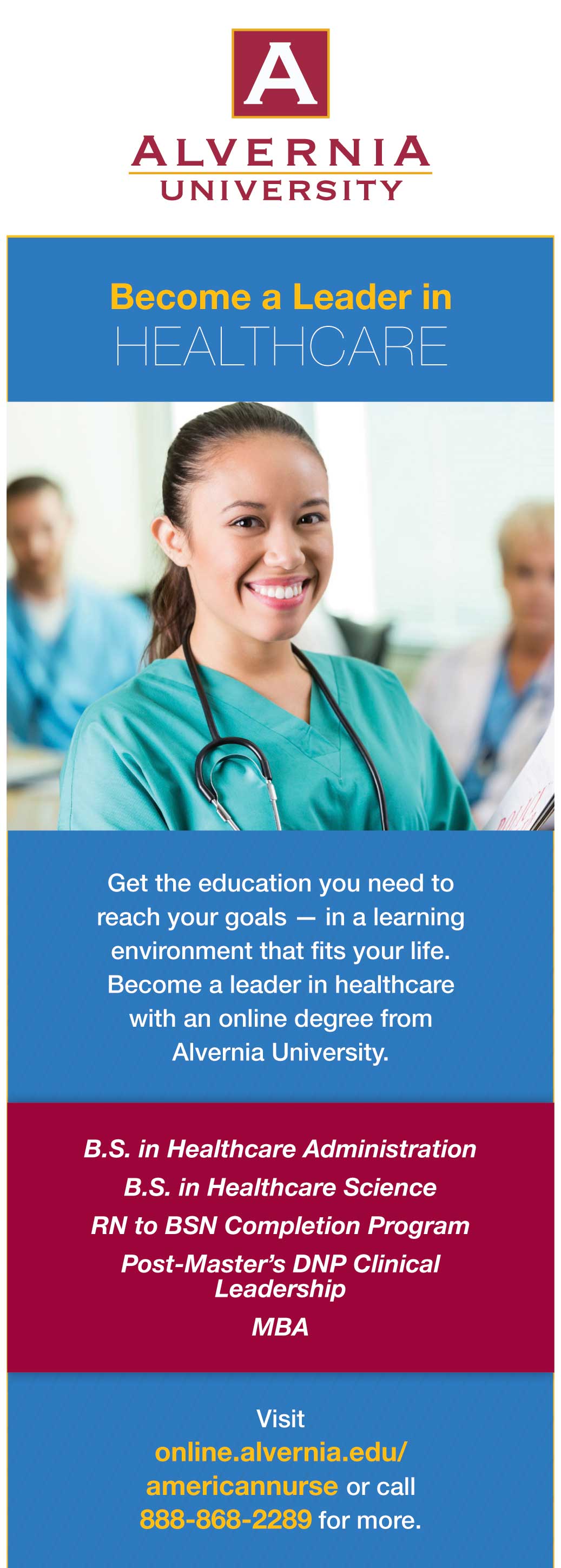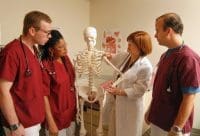This challenging approach to nursing education offers plenty of rewards.
By Janet Boivin, BSN, RN
Even with a 3.8 GPA from the University of Florida, Katrina Sherman, a junior majoring in English, harbored doubts that she could find a well-paying job when she graduated. So she began considering nursing as an option.
After graduating with a bachelor’s degree in English in 2010, Sherman searched for accelerated nursing programs across the country. She created a spreadsheet and systematically recorded program names, the types of credits each required for admission, and the deadlines for applying.
Sherman chose a newly opened accelerated program at Johns Hopkins University School of Nursing that included a nursing residency. For 12 months, her life was about nursing informatics, research, statistics, clinical rotations, and not much else, she says. Clinical rotations and classes were held simultaneously.
 The payoff was a bachelor of science in nursing degree (BSN), a guaranteed job at Johns Hopkins, and the expectation that she would eventually go on to earn a master’s degree in nursing to become an advanced practice nurse.
The payoff was a bachelor of science in nursing degree (BSN), a guaranteed job at Johns Hopkins, and the expectation that she would eventually go on to earn a master’s degree in nursing to become an advanced practice nurse.
“It was pretty intense,” says Sherman, who lives in Austin, TX, with her husband and baby boy. She works as a labor and delivery nurse at Seton Medical Center Austin. “[An accelerated program] wouldn’t be for everyone.” Sherman is now enrolled in Frontier Nursing University’s midwifery program based in Kentucky.
Consider the following when deciding if an accelerated program is a good fit for you. Benefits
Challenges
|
Many roads, same destination
The good news about nursing education today is that an array of options exists to suit your learning style, career interests, financial and time constraints, and lifestyle. You’ll find accelerated programs, online programs, and various program tracks that lead to different degrees in a variety of specialty areas.
The challenging news is that sorting out all the options and deciding which program is right for you is ever more confusing. Nursing experts say that potential students need to do more research, ask more questions, and know themselves much better than nursing students did in the past.
Because accelerated programs condense a great deal of information into an 18-month time frame (or less), you need to be sure you can devote the time to the program and immerse yourself in the learning experience, Sherman says. You also need to be self-disciplined and have effective time-management skills, she adds. (See Is an accelerated program right for you?)
“Accelerated programs are generally those that require a full-time credit load that is beyond the number often assigned in the industry,” says Robin Kirschner, EdD, DNP, RN, CNE, NEA-BC, CRA, Chamberlain College of Nursing’s Dean of MSN Specialty Tracks. “For example, a full-time undergraduate student would be expected to complete 12 credits per semester in a traditional program; in an accelerated program, the number of credits would likely be about 18 per semester.”
First, know thyself
Kirschner also advises potential students to consider what they’re most passionate about. Is it technology? Is it leadership? Is it direct care? And you should consider how this passion can be continued as your career ad- vances.
“We urge students not to work because of the amount of time and effort an accelerated program requires,” says Juliann G. Sebastian, PhD, RN, FAAN, University of Nebraska Medical Center, dean and chair of the American Association of Colleges of Nursing (AACN) Board of Directors.
Accelerated programs offer a “wonderful return on investment because of the short time frame,” Sebastian says. But you’ll still need to figure out how to pay for tuition and other related expenses.
Despite the heavy demands of an accelerated program, once you have the BSN or MSN in hand, you’ll be welcomed by healthcare recruiters. Past accelerated program graduates have proven themselves to be quick learners, hard workers, and dedicated professionals.
For more information about and locations of accelerated programs, go to AACN’s website www.aacn.nche.edu and search “accelerated nursing programs.” Also, most large university schools of nursing offer accelerated nursing programs that can be found on their websites.
Janet Boivin is a freelance writer.





















